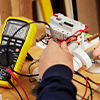Course Overview
If you enjoy maths, analysis, and making things work, you might enjoy this electrical engineering course.
As an electrical engineer you could work in planning and development or systems maintenance. Residential construction, pulp and paper, power companies and the defence force all need electrical engineers.
This course is practical and hands-on, with small class sizes and passionate tutors. You'll enjoy one on one support and attention and learn in well-equipped labs. You'll design and interpret technical, electronic instructions. And you'll develop, install, test and maintain the different types of equipment that produce, transmit and use power.
Topics include technical literacy, power generation and sustainable energy. You'll cover electrical and electronic principles and applications too.
Shortages of electrical engineers both here and overseas mean there are strong job prospects for qualified people. This course could be your start.
Upon successfully completing the requirements you'll receive the award of:
- New Zealand Diploma in Engineering (Electrical) (Level 6)
| Locations | Tauranga |
|---|---|
| Next intake | Feb 2026 View more details |
| Study options |
2 years full-time, including holidays (if applicable) Part-time study available |
| Total credits | 240 |
| StudyLink assistance | Available |
| Indicative Fees | To be confirmed for domestic students View full fees information |
| Eligibility | View entry criteria |
To see the information for international students change your location using the button at the top right of the screen.
Career opportunities
- Technical Support Engineer
- Supervising Technician Engineer
- Technician Engineer
- Production Engineer
- Production Manager
- Production Maintenance Manager
Topics you'll cover
Year 1 topics include:
- Engineering Fundamentals - fundamentals of a range of engineering disciplines
- Engineering Mathematics 1 - mathematical skills, concepts and understandings required to perform calculations and solve problems within engineering contexts
- Technical Literacy - technical research skills, as well as oral, written, graphical interpersonal communication skills
- Electrical Principles - general fundamental electrical circuit principles
- Electrical and Electronic Applications - application of general fundamental electrical and electronic principles
- PLC Programming 1 - programming PLCs to solve simple industrial problems
- Electronic Principles - develop further understanding of the application of fundamental electronic principles
- Power Engineering - three phase circuit theory as applied to power engineering
Year 2 topics include:
- Engineering Mathematics 2 - mathematical principles and engineering mathematical skills to solve engineering problems
- PLC Programming 2 - advanced knowledge of PLC systems, applications, and programming methods
- Electrical Machines - single and three phase electrical machines
- Introduction to Networks - introduction to the architecture, structure and functions and models of the internet to enable students to build a simple LAN
- Sustainable Energy and Power Electronics - concepts and applications of power electronics involved in small scale renewable energy systems
- Power Systems - three phase power systems and distribution systems
- Engineering Management - administering and managing projects effectively
- Engineering Project (Electrical) - an electrotechnology project derived from given specifications
Course Fees
| Indicative Fees * | To be confirmed for domestic students |
|---|
Please note, fees for our 2026 intakes are yet to be confirmed. Once they are, we will update our website to reflect the new 2026 fee amount.
Your final fee may vary if:
- you have a choice of topics/papers to study
- the qualification excludes GST
- there are extra course materials to purchase
- student levies apply
We’ll let you know if any of these apply to you.
* Important fee information, and hints and tips
Help with fees
Are you Eligible for Free Fees?
There are several ways to take advantage of free study at Toi Ohomai. Find out how on our Fees Free FAQ page.
Student Loans and Allowances
This course meets the requirements for student allowance and student loan applications through StudyLink.
- A student loan helps to pay for your course fees (the compulsory fees), study materials e.g. books, equipment, and living costs. You'll have to pay this money back.
- A student allowance is a weekly payment that can help with your living expenses while you're studying. You don't have to pay the money back.
Find out more and apply at studylink.govt.nz
Scholarships
Scholarships are one way you might be able to get some financial help. Any scholarships specifically related to this course are shown below, otherwise check out the full list of scholarships promoted by Toi Ohomai.
Course Entry Information
Entry criteria
To gain entry into this course, you are required to have:
- NCEA Level 2, including a minimum of 10 literacy credits at Level 1 or higher (for those who achieved NCEA Level 2 before 2013), AND
- a minimum total of 48 credits at Level 2 in four subjects including at least 12 credits in mathematics (preferably achievement standards in algebra, calculus or trigonometry), OR
- equivalent qualifications (e.g. International Baccalaureate or Cambridge), OR
- equivalent credits from appropriate trades training and/or demonstrated skills and experience
Standard Entry Criteria
Admission, entry, selection, and enrolment into programmes will be in accordance with the Academic Regulations and/or, where approved, specific programme regulations.
English language requirements
IELTS Academic score of 6 with no band score lower than 5.5 or completed New Zealand Certificate in English Language Level 4 with the Academic Endorsement or meets a relevant English Proficiency Outcome as outlined by NZQA.
Return to course overview
Course Locations and Intake Information
| Location | Campus | Start Date | |
|---|---|---|---|
| Tauranga | Windermere Campus | 23 Feb 2026 |
Study options
- 2 years full-time, including holidays (if applicable)
- Part-time study available
Important dates
Further Study Options
Courses Currently Under Development at Toi Ohomai, or Offered at Other Institutions
- New Zealand Diploma in Engineering Practice (for those working in industry)
- Bachelor of Engineering Technology
- Bachelor of Engineering


